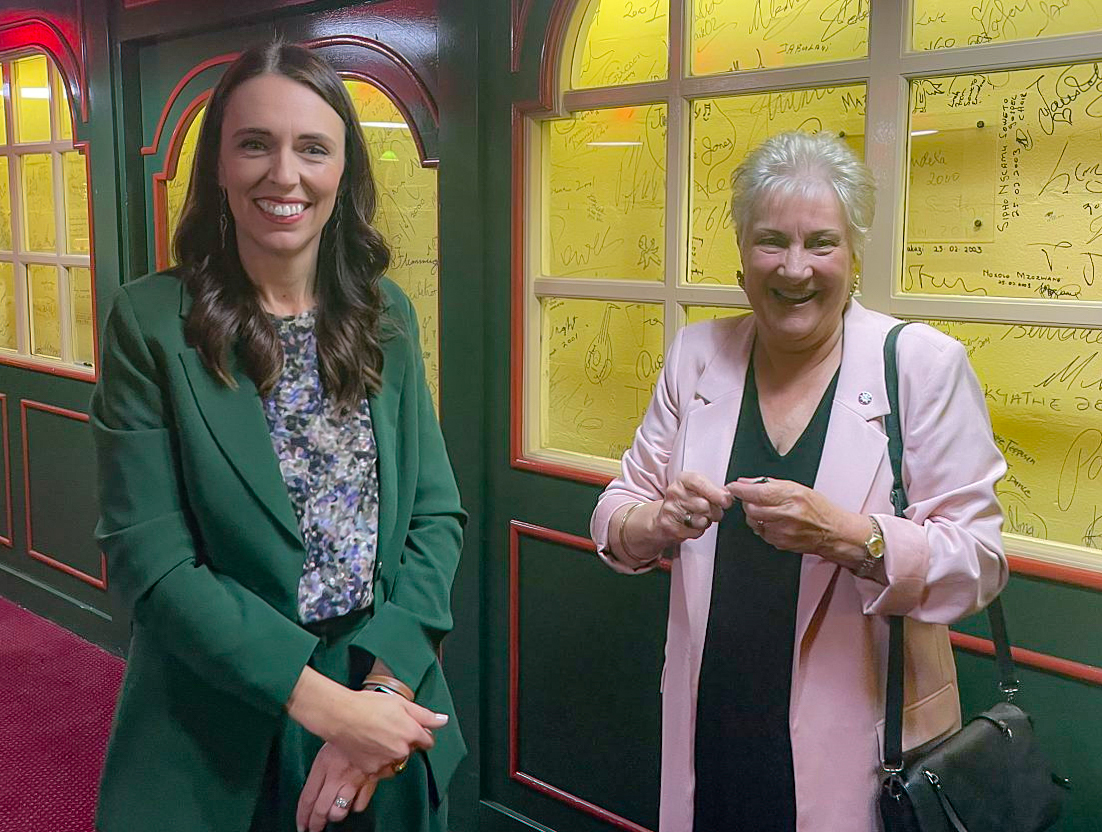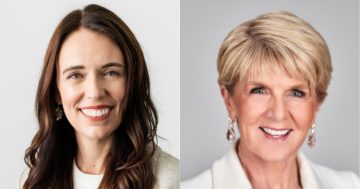
Former NZ Prime Minister Dame Jacinda Ardern and NZ High Commissioner Dame Annette King. Photo: Genevieve Jacobs.
It was just a moment, a few words, but there she was smiling warmly, hand held out to shake mine.
For much of the past decade, Jacinda Ardern has been one of the most famous women in the world. She was elected prime minister of New Zealand in 2017 and ever since has been greeted around the world as a rockstar, an icon, a role model.
But meeting her is nothing like meeting a superstar.
At the reception before her Mana Wahine event at the ANU last Thursday night (10 August), her gaze was direct and warm, her manner straightforward, friendly, low key. While others were speaking at the reception, she stood quietly to one side, not drawing focus from Chancellor Julie Bishop or NZ High Commissioner Dame Annette King.
And when the speeches ended, a room full of otherwise sensible middle-aged people, many of whom are perfectly used to meeting powerful people, mobbed the slender woman in a green pants suit as if she was a mixture of Beyonce and the late Queen.
Jacinda Ardern was by no means a perfect politician. There were big promises – like the ones to fix housing affordability, end child poverty or slash emissions – that her government could not fulfil.
When she faced the voters in October 2020, news analysis in this country suggested we’d all been a bit fooled by a fairytale and that New Zealanders were less enamoured of her than we believed.
Then she won the biggest landslide in post-war NZ history and Labor became the first party to hold majority government in a generation.
So what is it about Jacinda and that stardust effect?
The NZ High Commissioner told us tickets to the event on women’s leadership, where Dame Jacinda, legendary NZ actor Rena Owen, Julie Bishop and swimmer Bronte Campbell were interviewed by Laura Tingle, “went faster than a Taylor Swift concert”.
In the room on Thursday people were teary-eyed remembering her tremendous dignity and courage in the face of the Christchurch massacre, her ability to cut through traumatic, bewildering grief and bring people together.
“They are us,” she said of the men, women and children slaughtered at prayers, by a man whose name she never mentioned again.
She asked her people, often, to be both strong and kind. She had a rare emotional intelligence for a politician and she retained the gift of seeing the humanity in others.
I’ve always believed that most people go into politics because they want to represent their community and do the right thing. But it doesn’t always last. Grubby, grim, transactional political reality hardens people, some more than others.
I recall running into a senior Australian politician whom I hadn’t seen since we knew each other reasonably well at university. He looked straight through me until he clocked that I (then) worked for the ABC, whereupon his eyes lit up like a heat-seeking missile in pursuit of media attention.
In some sense, I don’t blame politicians for toughening up and shutting down. People want something from them all the time, unless they hate them, which also happens all the time.
Both must be exhausting and surely sometimes incredibly boring. Both would prompt you to don a mask, smile heartily with your mouth but not your eyes and reproduce the party line until further notice. Do anything, anything necessary to stay in power.
By contrast, Jacinda Ardern showed us another way to lead and another way to serve. It was sometimes lumpy and sometimes ineffective. But in an era of brutal divisiveness and weaponised polarisation in this country and elsewhere, some of her stardust would not go astray.













